California Track and Field Winter Championships 2019
- After the final day at the 2021 NCAA Indoor Track and Field Championships, the Arkansas women's team and the men's squad from Oregon took home the team titles.
- Cole Hocker of Oregon had a spectacular Saturday, with wins in both the mile and 3,000-meters.
- After being beaten in the final of the 400 meters, Texas A&M freshman Athing Mu ran the anchor leg for her team in the final event of the day, splitting 49.54 (an unofficial indoor 400-meter best).
After a year of cancellations because of COVID-19, the NCAA championships returned, and athletes made up for lost time by shattering collegiate records and providing breakthrough performances.
On the men's side, the final day of the championship featured a historic team effort from Oregon. The program came into the meet as the favorite to win, and the Ducks executed as such with six national champions and 79 points, the second largest total in meet history, according to the USTFCCCA. The victory is Oregon's fifth NCAA indoor team title.
"This [NCAA title] is even sweeter because it's more of a team effort," Oregon head coach Robert Johnson told reporters in a virtual mixed zone. "We hit on all cylinders all across the board, name an event and we scored in it, and that was impressive about this team... That's kind of what we built this team to be: well rounded."
The 2021 NCAA individual champions representing Oregon included freshman Emmanuel Ihemeje in the triple jump, sophomore Cole Hocker in the mile and 3,000 meters, freshman Micah Williams in the 60 meters, junior Charlie Hunter in the 800 meters, and the distance medley relay.
Behind Oregon, LSU finished second with 56 points and Georgia placed third with 35 points.
This content is imported from Twitter. You may be able to find the same content in another format, or you may be able to find more information, at their web site.
The women's team championship was won by Arkansas, a program that came from behind after the first two days of the meet to win the indoor title. The Razorbacks defended their 2019 indoor crown by putting up 68 points, beating runner-up Texas A&M by 11 points. According to the USTFCCCA, the point total for Arkansas is the second highest in NCAA meet history.
This content is imported from Twitter. You may be able to find the same content in another format, or you may be able to find more information, at their web site.
"It was a true team championship and the reason is that we were represented in 13 of the 17 events," Arkansas head coach Lance Harter said. "And when you have that, it's kind of a game of averages where we're going to have some hiccups along the way, and then we're going to have some breakthroughs."
On the team's home track, Arkansas earned victory with the help of several standout performances in the distance events, including 14 points in the mile and 17 points in the 3,000 meters. The Razorbacks also achieved critical scores in the distance medley relay, 60-meter hurdles, 4x400-meter relay, and 800 meters, among others.
Here are some of the highlights from Thursday, Friday, and Saturday at the Randal Tyson Center in Fayetteville, Arkansas.
Latest results from the 2021 NCAA Indoor Track and Field Championships
→ Sign up for RW+ All Access for the latest running news, health tips, gear reviews, and more! 🏃♀️🏃♂️
Cole Hocker wins the mile/3,000-meter double
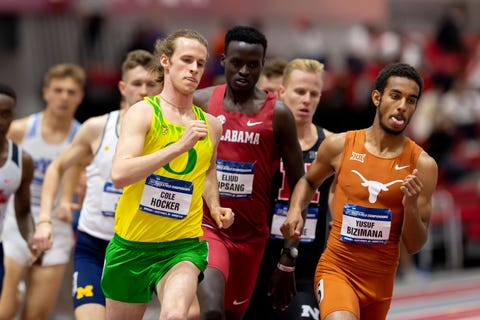
Andy Hancock/NCAA Photos
The last day of the meet started with a dominant win from Oregon sophomore Cole Hocker and continued with a historic double victory in Saturday's distance events.
After breaking the previous collegiate record with his teammate Cooper Teare in February, Hocker didn't leave anything on the table in his quest to win the NCAA mile crown.
By the bell lap, the race was Hocker's as he broke away from the field with every step in the final 200 meters, reaching the homestretch clear of any competition.
Hocker won the mile in 3:53.71, breaking the previous meet record of 3:54.74 set by Lawi Lalang in 2013. Behind Hocker, Eliud Kipsang of Alabama finished second in 3:55.93, a personal best. And Waleed Suliman of Ole Miss finished third in 3:57.26. Oregon's Reed Brown also scored by finishing fifth overall, totaling 14 points for the Ducks in that race.
After the race, Hocker told reporters in a virtual mixed zone that he wasn't stressed heading into the 3,000-meter part of the double because he "already had one of the best races of my life an hour before." That mentality proved to be successful when Hocker won the 3,000 meters, finishing 1-2 with his teammate Cooper Teare.
The race was controlled by the Oregon duo from the start. Teare led until 5:30 into the race when Antonio Lopez Segura of Virginia Tech tried to take over up front. But Segura's lead didn't last long. After 400 meters, Teare jumped to the lead once again and Mario Garcia Romo of Ole Miss attempted to follow up front.
At the bell lap, Teare ran away from the field for the last time. But on the final turn, Hocker unleashed an unbeatable kick to pass his teammate and win the race in 7:46.15, splitting 25 seconds on the last lap to secure a personal best. When asked by reporters if Hocker knew he could catch Teare on the last stretch, he said no.
"I was really confident at a mile in that I was going to be at least top four, if not top three, so going into the last 800, I felt like I was getting a little tired, sort of felt that mile from earlier," Hocker said. "With two laps to go is when I just stopped thinking about how I felt. And there was enough action up there with Ole Miss and Cooper going back and forth, and I was able to sit back there and then feed off of those moves. As the pace got better, I was still right there. I just went for it and I'm happy with the result."
Teare followed for second in 7:46.23. With the Ducks' 1-2 finish in the 3,000 meters, Oregon clinched the team title with a total of 79 points.
Charlie Hunter out-leans Finley McLear to win the 800 meters
This content is imported from YouTube. You may be able to find the same content in another format, or you may be able to find more information, at their web site.
National leader Charlie Hunter of Oregon came from behind to run down Finley McLear on the homestretch and win the men's 800-meter title in thrilling fashion.
The race started tactically with an opening 400-meter split of 52 seconds. For most of the race, the Oregon junior bided his time in the back of the top group, finally giving chase to McLear who broke away in the last 100 meters.
The photo finish showed Hunter on top in a winning time of 1:45.90. McLear, who runs for Miami (Ohio), finished second in 1:45.91. The performance was a personal best for McLear.
Hunter contributed to Oregon's sweep of the 800 meters, mile, and 3,000 meter events. According to the USTFCCCA, Oregon is the first program in meet history to sweep all three events in the same year.
Micah Williams runs personal best to win the 60 meters for Oregon
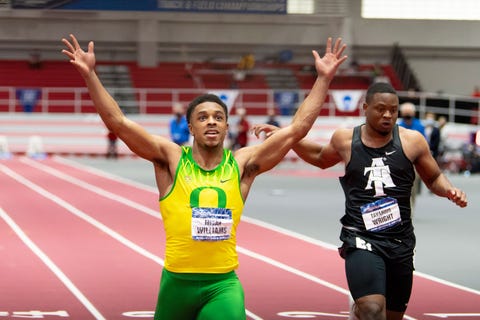
Andy Hancock/NCAA Photos
Micah Williams tied his personal best of 6.49 to win the men's 60-meter final, earning 10 points for Oregon in the team title chase. The freshman's performance is also the fastest time run by a collegian this year.
"It's more surreal because I never expected to be in this position, especially going to Benson [High School in Portland, Oregon]," Williams said. "I never thought that five years from now I'm going to be an NCAA 60-meter champion and it could go on outdoors....it's just truly a blessing."
Noah Williams throws down a personal best to win the 400-meter title
Noah Williams, a junior from LSU, won the men's 400 meters with a breakthrough performance in heat 2. Williams ran 44.71, the No. 3 fastest time in NCAA history and a world lead to score 10 points for the Tigers.
Behind Williams, Randolph Ross from North Carolina A&T finished second in 44.99, a personal best out of heat 1. And Jacory Patterson of Virginia Tech finished third, also running a personal best.
Damion Thomas upsets the national leader to win the 60-meter hurdles
In a tight battle to the line, Damion Thomas edged out Jamal Britt of Iowa and national leader Trey Cunningham of Florida State to win the NCAA title in the 60-meter hurdles. The senior from LSU ran a personal best of 7.51, leading a blanket finish to score 10 points for the Tigers.
His teammate Eric Edwards Jr. also scored points for LSU by finishing fifth, completing a major contribution for the Tigers in the team standings.
Matthew Boling runs personal best to take down national leader
This content is imported from YouTube. You may be able to find the same content in another format, or you may be able to find more information, at their web site.
The sophomore from Georgia, who went viral in 2019 for breaking the high school national record in the 100 meters, won his first NCAA title on Saturday. Boling edged out national leader Terrance Laird of LSU in heat 2 of the men's 200 meters, winning the crown in 20.19.
"My main problem the whole season is right as that second turn comes, I start grinding and pushing and lose my form, but I held it that whole curve," Boling said. "And I knew I was still in the lead by a couple of steps, but I also know Terrance is a really good finisher, so I just said to myself, you came this far, you executed this much, just keep your form and keep turning over."
Laird finished second in 20.20, also a personal best.
North Carolina A&T runs away with the 4x400-meter title
With an anchor leg that closed in 44.67, North Carolina A&T closed out the meet with the fastest race of the night, winning the 4x400-meter relay in 3:03.16 over Kentucky who finished second in 3:03.61 in the same heat. The Aggies' victory makes them the fifth-fastest program in collegiate history, according to the USTFCCCA. National leader Tennessee finished third in 3:04.10.
Sage Hurta runs a personal best to win the women's mile
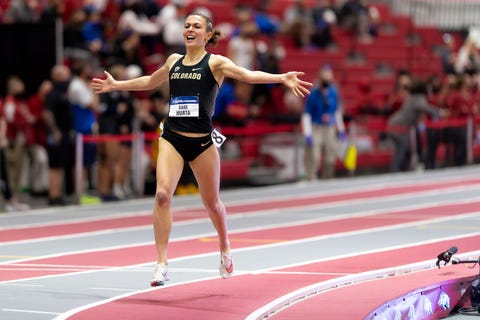
Andy Hancock/NCAA Photos
Colorado senior Sage Hurta ran away from the field with 500 meters to go to win the women's mile in 4:30.58, a personal best.
Arkansas attempted to control the pace with senior Kennedy Thompson taking the early lead and bringing the field through the first 800 meters in 2:18. But with 500 meters remaining, Hurta moved to the front and started to forge a gap between herself and the rest of the field.
At the bell lap, Hurta held a 10-meter lead between herself and senior Krissy Gear of Arkansas, who tried to catch up to the leader but ran out of real estate. Hurta's move in the later stages of the race paid off when she cruised to victory unchallenged on the homestretch.
After the race, Hurta expressed excitement for the win after navigating injuries, including a stress fracture in her tibia, in 2020. "The stubbornness that got me into injury trouble for the course of all the 2020 is the same stubbornness that I had with my cross-training, my rehab, my comeback, and going to this weekend," Hurta said. "And I said, you know what? These are the opportunities that got me through those really hard days where I didn't want to work out. I didn't want to get on the Alter-G, didn't want to get in the pool. [I realized] I got to make the most of it."
Gear and Thompson finished second and third, respectively, scoring critical points for the Razorbacks in the team standings.
Kemba Nelson upsets with a collegiate record in the 60 meters
This content is imported from YouTube. You may be able to find the same content in another format, or you may be able to find more information, at their web site.
Heading into the 60-meter final, all eyes were on national leader Twanisha Terry of USC. But Kemba Nelson of Oregon shocked the crowd with a breakthrough, winning her first NCAA title and shattering the collegiate record in the process.
The junior from Oregon ran 7.05, improving on the previous 7.07 collegiate record set by Hannah Cunliffe and Aleia Hobbs.
In the virtual mixed zone, Nelson said she surprised herself and didn't expect to break the record in Saturday's final. "I didn't even see the time until during the postrace interview, and I was blown away, honestly," Nelson said.
Kaelin Roberts holds off collegiate record-holder Athing Mu to win 400 meters
With Athing Mu on her shoulder, Kaelin Roberts held strong on the final lap of heat 2 to bring home the win for USC. The junior ran 50.84 to win her section and the NCAA title in the 400 meters.
Going into the final, Mu was favored to win after breaking the collegiate record in the 800 meters and running the national leading time in the 400 meters earlier this season. On Saturday, the Texas A&M freshman finished second in 51.03.
Freshman Ackera Nugent shocks to win NCAA title in 60-meter hurdles
Ackera Nugent, a freshman from Baylor, unleashed a breakthrough performance to win the 60-meter hurdles title in 7.92, beating Daszay Freeman of Arkansas and national leader Chanel Brissett of Texas.
Aaliyah Miller breaks the meet record in wire-to-wire 800 meters
This content is imported from YouTube. You may be able to find the same content in another format, or you may be able to find more information, at their web site.
Baylor senior Aaliyah Miller assumed the lead right away in the women's 800 meters and never looked back. She brought the field out in a blistering 56.90 for the first 400 meters and by 500 meters, her lead grew to 50 meters or so with a chase pack closing in on her over the bell lap. However, Miller was able to hold them off on the homestretch, closing in 33.21 for the last 200 meters.
Her winning time of 2:00.69 is a two-second personal best and breaks the NCAA meet record. She is now the second-fastest performer in collegiate history behind Mu, who set the record at 1:58.40 in February.
After contributing to Baylor's 4x400-meter relay, Miller shared that her strategy was to take the 800-meter race out from the gun, and she ultimately accomplished her goal on Saturday. After battling a series of injuries in the early part of her career, Miller expressed joy with finally reaching the top of the middle-distance ranks as a senior.
"It means everything," Miller said. "Through injuries, through tough seasons, through not having everything together, I knew what I needed to do to get back to the top. I've raced fast times, just when it came to national-type meets, I just didn't have the strength or the endurance to put it all together. But I knew coming in that I had the mentality, the speed, the strength that I needed to get through the rounds and then to put down a fast time and come out with the championship."
Abby Steiner equals collegiate record to win the 200 meters
The junior from Kentucky ran a personal best and equaled both the collegiate record and meet record to win the women's 200 meter title on Saturday.
Steiner ran 22.38 to beat Tamara Clark of Alabama who finished second in 22.45. Kynnedy Flannel of Texas finished third in 22.64.
After winning the DMR, Courtney Wayment returns to claim the 3,000 meters
This content is imported from YouTube. You may be able to find the same content in another format, or you may be able to find more information, at their web site.
Almost 24 hours after anchoring BYU, the NCAA champions in the distance medley relay, Courtney Wayment replicated her winning tactics to nab the 3,000-meter title.
Wayment put herself in perfect position for a late race move on Saturday night when Lauren Gregory of Arkansas assumed the early lead on. Around 3:00 into the race, Joyce Kimeli—the 5,000-meter champion—took over up front, but most of the runners in the pack remained in contention until 500 meters to go. The pack broke up when a collision between Elly Henes of NC State and Allie Schadler of Washington took place within the top group.
With 400 meters remaining, Wayment jumped to the front and accelerated all the way into the bell lap, holding off a hard-charging Gregory through the finish line. To beat her Razorback rival, Wayment ran 31.20 in the final 200 meters.
After the race, Wayment told reporters that from the mile on, she kept looking at her coach, Diljeet Taylor to see if she'd give the signal indicating she could take the lead. That signal was given with 400 meters to go, and Wayment was more than ready to respond. "I just went and I knew that I've run a 4:30 (mile) and 2:05 (800 meters)," Wayment said. "I know I have closing speed. And so it was more just, I'm going to go and see if I can put a gap. And if I can't, I don't want to lead the race and not win it."
The BYU senior earned her second NCAA title of the weekend in 9:01.47. Gregory finished second in 9:01.67 and Kimeli followed for third in 9:02.78.
With Gregory's finish, Katie Izzo's fourth-place, and Abby Gray's fifth-place performance, Arkansas scored 17 points with three finishers in the top five of the 3,000 meters, contributing to a winning team score of 62 points for the Razorbacks.
Athing Mu earns redemption in the 4x400-meter relay

Andy Hancock/NCAA Photos Getty Images
Texas A&M missed their own collegiate record, but they achieved a meet record by winning heat 3 of the women's 4x400-meter relay in 3:36.68, beating USC by over a second. The Aggies were anchored by Mu, who split a blistering 49.54 seconds in the last 400 meters while running away from USC anchor Kaelin Roberts, the runner who beat her in the open 400 meters an hour earlier.
According to World Athletics statistics expert Jon Mulkeen, Mu's anchor leg is the fastest indoor 400-meter performance (either individually or in a relay) in history.
After her double, Mu spoke with reporters about coming back from missing the title in the open 400 meters. "Going out, it was pretty fast. That's around the same time I usually do, even when I'm running 50 point, so it wasn't terrible," Mu said. "I think I just didn't have the greatest advantage just because I didn't make it to the break first….and then running in the second lane throughout the next lap wasn't really ideal. But I gave it my all so I'm pretty happy with that."
Minutes later, Mu regrouped to contribute to the Aggies' relay squad. "I knew going into the race, it wasn't just about me," she said. "It's a team effort and I saw all the ladies on our team running their legs real well. So I didn't want to be the person to mess that up. I just wanted to go out there and do my best, hopefully pull us through."
After the relay victory, Texas A&M finished second in the team standings with 57 points.
Oregon almost breaks the NCAA record again in the men's distance medley relay
As the collegiate record-holder, Oregon was a heavy favorite heading into the distance medley relay, and the Ducks did not disappoint.
The team of Reed Brown, Xavier Nairne, Charlie Hunter, and Cooper Teare won the NCAA title in 9:19.98 on Friday night, coming very close to breaking the NCAA record of 9:19.42, which the program set at the Razorback Invitational on January 29.
After competing in the mile prelim almost two hours earlier, Brown brought the baton in the lead through 1200 meters in 2:52.73. He handed off to Nairne who battled with sprinters from Ole Miss, Texas, and North Carolina, splitting 47.58 for 400 meters. Hunter took the stick for the 800-meter leg and brought the Ducks back into the lead by running 1:46.70, just 50 minutes after winning his section of the 800-meter prelim.
The excitement culminated on the anchor leg with Teare leading a group of five teams up front in the mile. The senior, who broke the NCAA mile record in February, held off his competitors by splitting 3:52.99 to bring home the victory and meet record for Oregon. Ole Miss finished second in 9:20.75, and Texas claimed the third podium spot by finishing in 9:23.73.
This content is imported from Twitter. You may be able to find the same content in another format, or you may be able to find more information, at their web site.
"Missing out on the [2020 NCAA championships] opportunity was really sad, but I think it just makes it that much more sweet this year when we can come and win it in the fashion that we did running an insanely fast time again," Teare told reporters in a virtual mixed zone after the race. "It definitely made up for last year. Last year was really tough, but I think it was just a little bit more motivation to come in here this year and not take anything for granted and put our best foot forward."
BYU wins first NCAA title in the women's distance medley relay
While Arkansas attempted to run away from the field in the first three relay legs, BYU never lost contact and the Cougars' efforts paid off in a breakaway anchor performance.
With a strong 3:21 1200-meter leg from Olivia Hoj Simister, a 400-meter split of 52.41 from Alena Ellsworth, and a 2:05.74 800-meter performance from Lauren Ellsworth-Barnes, the Cougars found themselves in perfect position for a takeover by the mile.
In the early laps of the anchor leg, Krissy Gear of Arkansas led the field, but Courtney Wayment of BYU comfortably pulled away from Gear and established a 50-meter lead on her competitors by the bell lap. Running solo, Wayment brought home the first ever DMR win in school history for the Cougars by finishing in 10:52.96, splitting 4:32.90 for the mile. The winning time makes BYU the sixth-fastest team in collegiate history, according to the USTFCCCA, and shatters the previous school record.
After the race, Wayment spoke about the significance of coming back and winning after two of her teammates missed out on the opportunity to race in 2020.
"Two of our girls, Lauren and Elena Ellsworth were on the team last year that didn't get to race the DMR because of COVID, and it's Liv [Olivia] and I's first time being on the DMR," Wayment said. "It was more than just winning a national title tonight. It was racing for what we've been through this last year. Coach [Diljeet] Taylor talked a lot about winning the wait and it was a hard last year, but tonight was about doing it for your team and your heart and for Coach Taylor, so it was definitely an awesome night."
Behind BYU, Arkansas held on for second by finishing in 10:57.19. Florida State closed hard against Alabama to claim third place in 10:59.16. After a protest, Alabama was ultimately disqualified for impeding another team.
Wesley Kiptoo doesn't hold back in the men's 5,000-meter final
Even with the NCAA Cross-Country Championships coming up on Monday, Wesley Kiptoo didn't leave anything to chance in his pursuit of winning the 5,000 meters.
The Iowa State junior assumed the lead right away, stringing the field out with a 4:06 first mile. Only Amon Kemboi followed Kiptoo in his title chase, but the Arkansas senior was unable to hold the fast pace and faded from contention after the mile mark.
By 3,000-meters—which he reached in 7:55—Kiptoo held a 50-meter lead over the chase pack and never looked back. Running almost the entire race solo, Kiptoo continued with consistent 200-meter splits of 33-32 seconds and closed with a 31-second last lap. He won the final in 13:23.77, breaking the meet record of 13:25 (set by Lawi Lalang in 2012) and setting a personal best.
Kiptoo is one of the favorites to win an individual title at the cross-country meet. When asked by reporters about his approach to running back-to-back championships, he expressed total confidence.
"We have three days, and it's just like a long run and then you do a workout the following day, so it's not that hard," Kiptoo said.
This content is imported from Twitter. You may be able to find the same content in another format, or you may be able to find more information, at their web site.
Behind Kiptoo, Eric Hamer of Colorado State and Morgan Beadlescomb of Michigan State battled for second with Hamer ultimately reaching the line first in 13:29.60. In total, 11 finishers achieved personal bests. Out of the 16 competitors in the field, 13 runners are also scheduled to compete at the cross-country championships on Monday.
Joyce Kimeli wins an ultra-tactical race in the women's 5,000-meter final
Auburn's Joyce Kimeli jumped out to an early lead and turned the race into a tactical battle over 5,000 meters.
Around 1200 meters into the race, the junior backed off the front, urging Grace Forbes from Rice to lead the field. But after a few laps, Kimeli moved to the front once again and began to accelerate.
Around 10 minutes in, Katie Izzo of Arkansas jumped ahead, stringing the field out for the first time in the race. But after a few laps, Izzo pulled back and let Kimeli and Forbes lead once again. With a group of nine runners still in the mix, Kimeli finally pushed the pace with 400 meters remaining. At the bell lap, a race for first ensued between Kimeli, Elly Henes of NC State, and Bethany Hasz of Minnesota.
On the homestretch, Kimeli pulled away for the last time, crossing the finish line in 15:48.98. Hasz finished second in 15:49.62 and Henes followed for third in 15:49.86. In a surprising development for No. 1 Arkansas' team score, Izzo—who came into the championship as the national leader—faded to ninth overall.
The victory is Kimeli's first NCAA title and best performance ever at NCAAs. In 2019, she finished 21st in the 5,000 meters at the NCAA Outdoor Track and Field Championships.
"I'm feeling good," Kimeli said. "I'm so excited, and I thank God for everything. It's been hard for me to train with this COVID, and I appreciate everything I got today."
Tyra Gittens breaks the collegiate record in the pentathlon
The championship weekend started with a record on Thursday. Gittens shattered the collegiate record by scoring 4,746 points in the pentathlon. In the process of improving on the previous NCAA record (4,703 set by Kendell Williams in 2016), the Texas A&M junior also set a national record for Trinidad and Tobago.
Gittens started the competition by finishing second in the 60-meter hurdles with a time of 8.72. She cleared 1.93 meters in the high jump, threw 13.86 meters in the shot put, and leapt 6.58 meters in the long jump. She officially claimed the record after running 2:28 in the 800 meters.
"Today was definitely a great confidence boost. … It felt like everything that I've been doing in practice just came together," Gittens said. "Nothing was an accident, it definitely took a lot of effort, but today means so much to me."
This content is imported from Twitter. You may be able to find the same content in another format, or you may be able to find more information, at their web site.
JuVaughn Harrison makes history in the jumps
In the span of two hours and 10 minutes, JuVaughn Harrison became the first athlete ever to win both the long jump and the high jump at the NCAA Indoor Championships in the same year. He also accomplished the feat at the 2019 NCAA Outdoor Championships.
On Friday, the senior from LSU cleared 2.30 meters in the high jump and hit 8.45 meters in the long jump. Both marks are personal bests. And he became the third-best performer in collegiate history with his winning jump of 8.45 meters, according to the USTFCCCA.
This content is imported from Twitter. You may be able to find the same content in another format, or you may be able to find more information, at their web site.
Tara Davis breaks the NCAA record in the women's long jump
Tara Davis, a junior from Texas, broke the collegiate record to win the women's long jump. Davis cleared 6.93 meters, which improved on the previous collegiate record of 6.91 meters set by Elva Goulbourne of Auburn and Whitney Gipson of TCU who both cleared the mark.
Claire Bryant of Florida finished second in 6.70 meters and Gittens finished third with a jump that cleared 6.68 meters. Both athletes set personal bests.
Georgia goes 1-2 in the heptathlon final
The Georgia duo of Karel Tilga and Kyle Garland finished first and second, respectively, in the heptathlon championship. Tilga scored 6,264 points, a personal best and Garland scored 6,200 points, also a personal best.
Over the span of two days, the champion from Tartu, Estonia completed the 60 meters in 7.09, finished second in the long jump (7.62 meters), won the shot put (16.04 meters), finished second in the high jump (2.06 meters), placed seventh in the 60-meter hurdles (8.24 meters), and finished third in the pole vault (4.96 meters). He closed out the competition by winning the 1,000 meters in 2:36.
Tilga is now the No. 2 performer in collegiate history behind Olympic champion Ashton Eaton while Garland is now the No. 4 performer. According to the USTFCCCA, it's the first time in NCAA meet history that teammates finished 1-2.
- Twanisha Terry almost breaks the NCAA record in the women's 60-meter prelim
Twanisha Terry of USC came dangerously close to breaking the collegiate record by winning heat 2 of the 60 meters in 7.09, a personal best for the senior. The collegiate record is a tie between former Oregon NCAA champion Hannah Cunliffe and LSU NCAA champion Aleia Hobbs who both ran 7.07 while competing in the college ranks. That mark could be in jeopardy if the sprinters carry the same momentum into Saturday's final.
Kiara Grant of Norfolk State emerged with a breakthrough performance to win heat 1. The junior blasted a victory in 7.11, which is a personal best. Behind her, Joella Lloyd of Tennessee finished second in 7.17. Kemba Nelson of Oregon, Jada Baylark of Arkansas, Tamara Clark of Alabama, Halle Hazzard of Virginia, and Alfreda Steele of Miami all qualified for the final.
Great Foam Rollers for Recovery

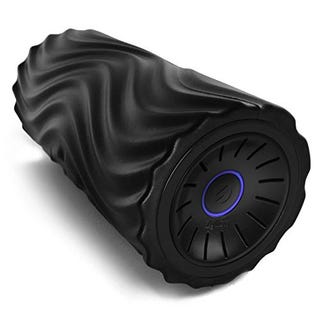

R4 Deep Tissue Body Roller

Rush Roller
Trigger Point implus.com
$44.99
The indoor championships continue on Saturday, with several finals set to be contested. Here are some highlights from the prelim heats in the first two days.
- Record-holder Sam Tanner misses the final in the men's mile
In the first heat, the Oregon duo of Reed Brown and Cole Hocker controlled the pace early, splitting 58.4 for the opening 400 meters and 1:58.14 at the halfway point. Hocker took control of the lead and accelerated in the remaining laps to win the section in 3:56.57. Behind Hocker, the race was on for the final three automatic qualifying positions. Michigan junior Tom Dodd, Sean Dolan of Villanova, and Waleed Suliman of Ole Miss closed for second, third, and fourth, respectively, all running 3:57.64 and faster.
The biggest surprise to come out of the second heat was Sam Tanner of Washington fading to fifth and missing Saturday's final. Tanner was a favorite to win after he broke the absolute collegiate record in the 1500 meters when he ran 3:34.72 at the New Balance Indoor Grand Prix on February 13. Eliud Kipsang of Alabama won the heat in 4:05.63. Yusuf Bizimana of Texas finished second in 4:05.64, Adam Fogg finished third in 4:05.73, and Lucas Bons finished fourth in 4:06.19, claiming the final automatic qualifying spot.
The time qualifiers came out of heat 1 with Brown and George Kusche of Nebraska running 3:58.01 and 3:58.24, respectively.
- LSU and Arkansas load up for the men's 60-meter hurdles final
Damion Thomas of LSU breezed through the first heat by winning in 7.56, which is a personal best for the senior. Jamal Britt of Iowa followed with a personal best of his own to finish second in 7.58 and earn the final automatic qualifying spot. Arkansas' Philip Lemonious and Tre'Bien Gilbert also qualified on time out of heat 1.
National leader Trey Cunningham won the second heat with ease, crossing the finish line in 7.57. Jesse Henderson of Mississippi State followed for second in a 7.66 personal best. Eric Edwards Jr. was the last hurdler to qualify out of heat 2, giving LSU two competitors heading into the final on Saturday.
- North Carolina A&T sends two sprinters to the Men's 400-meter final
Teammates Randolph Ross and Trevor Stewart of North Carolina A&T both secured spots to compete in the men's 400-meter final by running 45.53 and 45.86, in their respective heats. Noah Williams of LSU ran 45.34 to win heat 1 in the fastest time of the day, and Champion Allison of Alabama ran a personal best of 45.97 to qualify out of heat 2.
- Multiple Ducks will race in the men's 60-meter final
Micah Williams of Oregon backed up his No. 1 ranking by winning heat 2 in 6.52, the fastest time of the day. His teammate, Gaston Bouchereau also qualified by running 6.63 in heat 1, a promising development for the Ducks' team title chase.
In the first heat, Rikkoi Brathwaite equaled his personal best to win and automatically qualify. The Indiana junior ran 6.55 to beat Tavarius Wright of North Carolina A&T, who also ran a personal best by finishing second in 6.56.
- Jason Gomez favored in the men's 800-meter final
Leading from start to finish, Jason Gomez of Iowa State won the first heat in a season's best time of 1:47.65. Samuel Voelz of Notre Dame and Takiedinne Hedeilli of Texas Tech secured the other two automatic qualifying spots in the first heat. In heat 2, national leader Charlie Hunter of Oregon claimed an easy victory, crossing the line in 1:48.47 ahead of runner-up Finley McLear of Miami (Ohio) who finished in 1:48.56.
- Twanisha Terry almost breaks the NCAA record in the women's 60-meter prelim
Twanisha Terry of USC came dangerously close to breaking the collegiate record by winning heat 2 of the 60 meters in 7.09, a personal best for the senior. The collegiate record is a tie between former Oregon NCAA champion Hannah Cunliffe and LSU NCAA champion Aleia Hobbs who both ran 7.07 while competing in the college ranks. That mark could be in jeopardy if the sprinters carry the same momentum into Saturday's final.
Kiara Grant of Norfolk State emerged with a breakthrough performance to win heat 1. The junior blasted a victory in 7.11, which is a personal best. Behind her, Joella Lloyd of Tennessee finished second in 7.17. Kemba Nelson of Oregon, Jada Baylark of Arkansas, Tamara Clark of Alabama, Halle Hazzard of Virginia, and Alfreda Steele of Miami all qualified for the final.
Compression Gear for Recovery

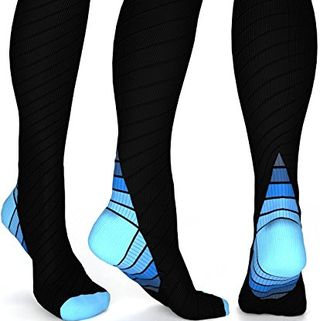
Compression Socks
Physix Gear Sport amazon.com

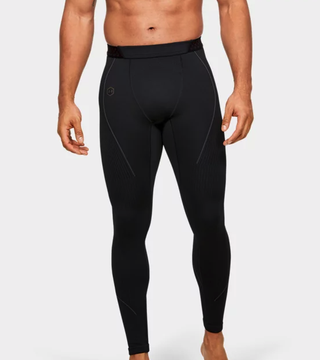
Taylor Dutch Taylor Dutch is a sports and fitness writer living in Chicago; a former NCAA track athlete, Taylor specializes in health, wellness, and endurance sports coverage.
This content is created and maintained by a third party, and imported onto this page to help users provide their email addresses. You may be able to find more information about this and similar content at piano.io
California Track and Field Winter Championships 2019
Source: https://www.runnersworld.com/races-places/a35827966/ncaa-indoor-track-and-field-championships-2021-results/
0 Response to "California Track and Field Winter Championships 2019"
Postar um comentário